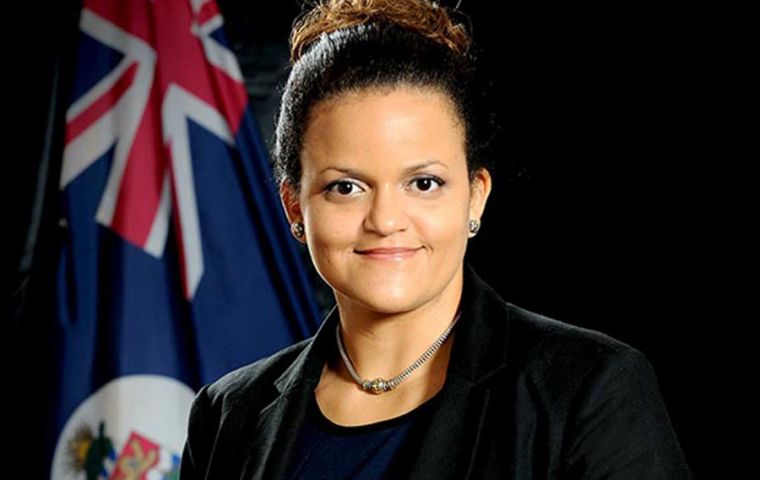MercoPress. South Atlantic News Agency
UK beneficial ownership vote alarms Overseas Territories; financial services vital for several islands
 Minister Tara Rivers stressed Cayman's “high level of ongoing cooperation” on beneficial ownership, enabling more than 100 tax authorities globally
Minister Tara Rivers stressed Cayman's “high level of ongoing cooperation” on beneficial ownership, enabling more than 100 tax authorities globally  Bermuda’s Premier David Burt says his territory “already has some of the most responsive and comprehensive registers of beneficial ownership…”
Bermuda’s Premier David Burt says his territory “already has some of the most responsive and comprehensive registers of beneficial ownership…” A vote by the UK parliament to insist that Britain’s Overseas Territories introduce publicly available beneficial ownership registers by December 31, 2020, has sparked anger and dismay within these autonomous, mainly small island, jurisdictions.
An amendment to a UK Sanctions and Anti-Money Laundering Bill requires the British government to impose such registers on its OTs by this deadline, if the local administrations have not created their own. The UK currently has the world’s only public beneficial ownership register – but it only covers England, Scotland, Wales and Northern Ireland – see http://ownershiptransparency.com/
The chief ministers of the Cayman Islands, Bermuda, the British Virgin Islands (BVI) and Gibraltar have spoken out in anger, claiming the vote undermines long-established autonomy, and threatens their important financial sectors.
They have been embittered by the law does not cover UK crown dependencies the Isle of Man, Guernsey and Jersey (because of centuries-long conventions, UK legislation usually does not apply to these three jurisdictions, but it does to OTs).
Other territories covered by amendment to Britain’s Sanctions and Anti-Money Laundering Bill include Anguilla, the Turks & Caicos Islands, the Falkland Islands, Montserrat, and other small islands less dependent on financial services.
For the OTs with major finance sectors, BVI Premier Orlando Smith was typical in his criticism, claiming: “This is a deeply flawed policy,” harming BVI efforts to recover from last year’s devastating hurricane season. He and other OT premiers argued that not only would a public register cause investors, companies, insurers and deposit holders to quit their financial sectors for jurisdictions with tougher privacy laws, but that existing closed OT beneficial ownership registers already fighting financial crime effectively.
Bermuda’s Premier David Burt says his territory “already has some of the most responsive and comprehensive registers of beneficial ownership…those registers are updated in real time on every share transfer…”
Cayman financial services and home affairs minister Tara Rivers stressed the Caymans’ “high level of ongoing cooperation” on beneficial ownership, which enables more than 100 tax authorities globally, including HMRC, and UK crime agencies to access information “which states who owns what and how much in relation to Cayman companies”.
As for the potential impact on OT’s should the UK impose public registers, University of the West Indies (UWI) economists warned of trouble ahead. Dr Anthony Gonzales, honorary research fellow at UWI’s Trinidad branch, says: “That is the mainstay of their economies. So, if that goes you could just imagine what you’re left with. They’re heavily dependent on offshore banking, to generate government revenue and foreign exchange.” He wondered if – ultimately – the UK would go ahead with the change, because if they crashed, “these countries would have to look to Britain to fund them”.
Economist Jeremy Stephen, president of the Barbados Economics Society and lecturer at UWI’s Barbados, campus, thinks the OTs could adapt their economies to survive and comply with the new rules. This would include building on their financial expertise, he suggests, developing exports such as hedge fund services and financial technologies, to “sustain these economies”, while “practising transparency in their financial sectors”. Without this, OTs “may have to rethink if they wish to remain a territory of the UK”, because, then, a register could “shut down the economy completely”.
Philip Anderson, director of corporate services provider Estera Services (Bermuda) Ltd, and an FCCA, says tax inspectors, anti-money laundering regulators and police already have the right obtain information from OT beneficial ownership registers, he says. Also, by making registers public, there are real downsides, he suggested. The loss of privacy to wealthy investors and depositors could increase their security risks, he suggested: “There are genuine threats of kidnapping. People who have such wealth need protection.”
Meanwhile, all beneficial ownership registers will need to comply with data protection laws, gaining in strength worldwide, such as the European Union’s (EU) general data protection regulation, in force from May 25 – which will protect information about EU-based depositors and investors in Bermuda, even though it and other OTs remain outside the EU.
Finance is big business for OTs. For example Bermuda’s annual GDP from Q4 2016 to Q3 2017 was US$ 4.77 billion. Its positive trade balance in services was US$ 1.569 billion, mostly financial. International business, including insurance, accounts for 27.3% of GDP; financial intermediation 12.6%, for instance. Wealth is high – US$ 73,000-per-head of the 65,300 population. The British Virgin Islands’ (BVI) 2017 GDP, says the UN, was US$ 908 million – of which 87.8% comprised services
According to consultancy Capital Economics, the BVI’s international business and finance centre generates US$ 330 million annually and delivers three-fifths of government revenue. The 31,000 islanders enjoy an average GDP-per-head of US$ 30,144. The Cayman Islands government says financial and insurance services accounts for 40.5% of the territory’s US$ 2.96 billion GDP (in 2016). The 60,765 islanders have a US$ 48,314 annual GDP-per-head lifestyle.
These incomes far exceed those of many Caribbean independent countries lacking such offshore finance expertise. The annual GDP-per-head for Dominica’s 74,000 people was US$ 7,051 in 2017, says the UN. In St Kitts & Nevis – it was US$ 15,771 (population 54,821). In Trinidad & Tobago (population 1.3 million), it was US$ 19,062 and in Jamaica (population 2.8 million), US$ 5,105.




Top Comments
Disclaimer & comment rules-

-

-

Read all commentsVoice, V0ice, Vestige, Think et al, sock-puppeteer extraordinaire and mythology major
Jul 05th, 2018 - 12:03 am +1“Force these ...to declare Independence”
Still trying to take end runs around mandatory UN Charter articles. I know its the Argentine way, but theres not a chance in hell, even if that was the UK's preference.
Voice, V0ice, Vestige, Think et al, sock-puppeteer extraordinaire and mythology major
Jul 05th, 2018 - 11:12 am +1“Merely your opinion based on what?” The following, irrefutable mediatory international law. Ask and you will receive, how do like these apples?
Self-Determination Defined UN Charter
55. With a view to the creation ..and self-determination of peoples,
56. All Members pledge themselves ...for the achievement of the purposes set forth in Article 55.
73. Members of the United Nations which have or assume responsibilities for ..peoples have not yet attained .. self-government recognize the principle ..b. to develop self-government, ...“
ICJ and Self-Determination”
...opinion on Kosovo's declaration ...
”is that the right of self-determination, which the ICJ found to be jus cogens in the East Timor case, is a right of all peoples, not only of those in a colonial context. ... “
Western Sahara; “The validity of the principle of self-determination, defined as the need to pay regard to the freely expressed will of peoples, ...the subsequent development of international law in regard to non-self-governing territories, as enshrined in the Charter of the United Nations, made the principle of self-determination applicable to all of them”
The Case Concerning East Timor and Self-determination
”By virtue of the principle of equal rights and self-determination of people ...”
The United Nations, Self-Determination and The Namibia Opinions
This story, which is very old by the way, is of little to no concern to us in the Falklands. Our cousins with the big offshore money industries are not too happy but it's not on our radar at all really because there will be little in the way of implications for us.
Jul 05th, 2018 - 09:38 pm +1Commenting for this story is now closed.
If you have a Facebook account, become a fan and comment on our Facebook Page!